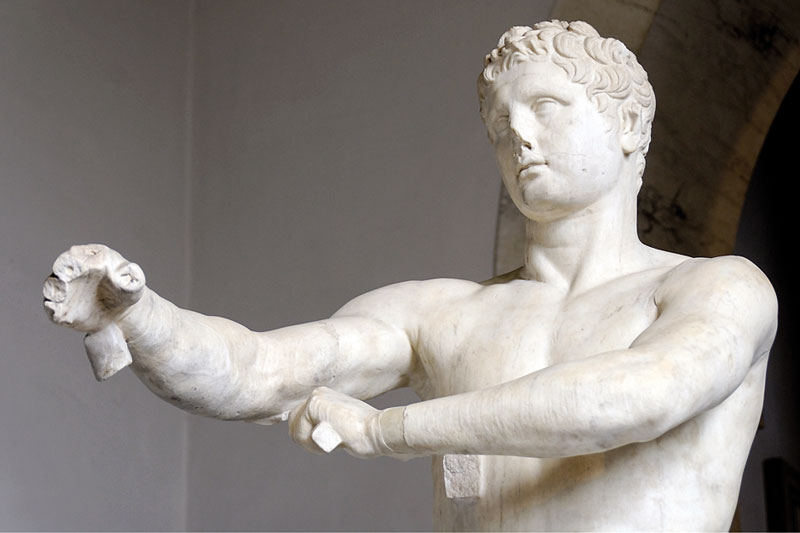
Rome, c. 1st century Pliny the Elder (23-79) in Naturalis Historia tried to gather the scientific knowledge of Antiquity and, among other things, explained how expensive the sweat of athletes was. And it wasn't about the hard workouts that athletes had to do to get victory and solemnity, that is, what the Roman writer said should not be taken in a figurative sense, but literally. Pliny does not mention an exact price, but in ancient Rome the sweat of athletes and gladiators was sold face to face.
Once upon a time, Greeks and Romans did not use soap. Once immersed in the water, various oils and ointments were administered to the skin, and to eliminate the old accumulated dirt and new detergents, if no water was used, a type of pissor called strigil was used by the Romans.
The athletes frequently used the metal tool. Before competing or training, oil was applied to the skin to condition the skin and protect it from minor impacts. At the end of the session, the body was rubbed with strives and remains of oil, sweat, dust and skin were removed. As athletes and gladiators were admired models of strength and courage, those responsible for gyms and paddles came up with the idea that stricken fingernails could become a benefit. Thus, as souvenir salespeople, at the entrance of the circus there were small stalls of sale of the pasty substance that the athletes had thrown in small and expensive doses (fat from dead animals in combat was also sold, at cheaper prices). Sweat stored the energy of its original owner and, therefore, had the ability to cure numerous physical problems and diseases, cosmetic properties, as well as being aphrodisiac. Beyond the placebo effect, Pliny does not provide evidence of the efficacy of the alleged miracle medicine.
To take the rancid sweat of others, to flush the teeth with urine... although many of the hygiene habits of the past seem to us at least dubious, you don't have to go until ancient times to find more examples. Ten years ago, in a well-known Internet auction house, the sale offer of the t-shirt “Beckham has signed and sudado (sic)” was published, which started in 4,500 euros. In 2007, the t-shirts of the tennis players Shanghai, Rafael Nadal and Andy Roddick were sold at a price of 1,100 euros at auctions. The suit worn by Roger Federer a few months ago reached only 1.011 euros, although presenter Jason He promoted it perfectly: “It keeps its natural smell and does not pass through the laundry.”
Until now we have believed that those in charge of copying books during the Middle Ages and before the printing press was opened were men, specifically monks of monasteries.
But a group of researchers from the University of Bergen, Norway, concludes that women also worked as... [+]
Florentzia, 1886. Carlo Collodi Le avventure de Pinocchio eleberri ezagunaren egileak zera idatzi zuen pizzari buruz: “Labean txigortutako ogi orea, gainean eskura dagoen edozer gauzaz egindako saltsa duena”. Pizza hark “zikinkeria konplexu tankera” zuela... [+]
Ereserkiek, kanta-modalitate zehatz, eder eta arriskutsu horiek, komunitate bati zuzentzea izan ohi dute helburu. “Ene aberri eta sasoiko lagunok”, hasten da Sarrionandiaren poema ezaguna. Ereserki bat da, jakina: horra nori zuzentzen zaion tonu solemnean, handitxo... [+]
Linear A is a Minoan script used 4,800-4,500 years ago. Recently, in the famous Knossos Palace in Crete, a special ivory object has been discovered, which was probably used as a ceremonial scepter. The object has two inscriptions; one on the handle is shorter and, like most of... [+]
Londres, 1944. Dorothy izeneko emakume bati argazkiak atera zizkioten Waterloo zubian soldatze lanak egiten ari zela. Dorothyri buruz izena beste daturik ez daukagu, baina duela hamar urte arte hori ere ez genekien. Argazki sorta 2015ean topatu zuen Christine Wall... [+]
Kirola eta oroimena uztartuko dituzte, bigarrenez, mendi-martxa baten bitartez. Ez da lehiakorra izanen, helburua beste bat delako. La Fuga izeneko mendi martxak 1938ko sarraskia gogorarazi nahi du. Ezkabako gotorlekuan hasi eta Urepelen amaituko da. Maiatzaren 17an eginen dute.
Bilbo, 1954. Hiriko Alfer eta Gaizkileen Auzitegia homosexualen aurka jazartzen hasi zen, erregimen frankistak izen bereko legea (Ley de Vagos y Maleantes, 1933) espresuki horretarako egokitu ondoren. Frankismoak homosexualen aurka egiten zuen lehenago ere, eta 1970ean legea... [+]
Fusilamenduak, elektrodoak eta poltsa, hobi komunak, kolpismoa, jazarpena, drogak, Galindo, umiliazioak, gerra zikina, Intxaurrondo, narkotrafikoa, estoldak, hizkuntza inposaketa, Altsasu, inpunitatea… Guardia Zibilaren lorratza iluna da Euskal Herrian, baita Espainiako... [+]
Deportazioaren Memoriarako Euskal Koordinakundeak aintzat hartu nahi ditu Hego Euskal Herrian jaio eta bizi ziren, eta 1940tik 1945era Bigarren Mundu Gerra zela eta deportazioa pairatu zuten herritarrak. Anton Gandarias Lekuona izango da haren lehendakaria, 1945ean naziek... [+]